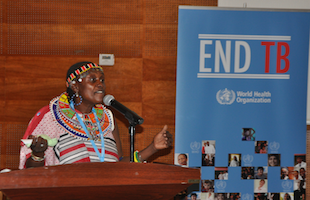
More than 150 participants from 90 community-based, nongovernmental and other civil society organizations, are meeting today with National TB Programmes and partners at a landmark WHO meeting to ramp up efforts to end TB.
To emphasize the importance that WHO attributes to communities, NGOs and CSOs in successfully ending TB, Mary Naukot, a community health volunteer from Isiolo, Kenya shared her grassroots experience of integrating community-based TB into her work in primary health care: “Most members in my community die of TB without knowing what it is. They depend on livestock to live and do not care about health. As a community health volunteer, I educate my community about health issues, including TB screening, and they appreciate our efforts”, she said.
Her powerful words marked the opening of the consultation meeting, in which Dr K. Admasu, Minister of Health of the Federal Democratic Republic of Ethiopia, and Dr Eric Goosby, UN Special Envoy on Tuberculosis, delivered keynote speeches.
Citing the positive experience of community engagement in his country, Dr K. Admasu, Minister of Health of the Federal Democratic Republic of Ethiopia, said: “In Ethiopia, we have experienced first-hand the positive impact of working with communities for health. Wiping out the TB epidemic will only be possible with strong political commitment and engagement of communities.”
During the three-day meeting, participants will review country experiences and lessons learned from existing community engagement efforts to combat TB. A key outcome of the meeting will be a joint roadmap outlining specific actions for NGOs and other CSOs, National TB Programmes and other stakeholders to successfully implement the End TB Strategy.
“Strengthening NGO and CSO engagement is critical to reach the ambitious targets of the Strategy to end the global TB epidemic by 2030”, said Dr Mario Raviglione, Director of WHO’s Global TB Programme. “This consultation serves as an impetus to generate greater commitment and action by NGOs and other CSOs to end TB”. The End TB Strategy, adopted by all WHO Member States, serves as a blueprint for countries to reduce TB incidence by 80% and TB deaths by 90% and to eliminate catastrophic costs for TB-affected households by 2030.
While there has been significant progress in the fight against TB, with this year’s death rate nearly half of what it was in 1990, 1.5 million people died from TB in 2014. “Most of these tragic deaths could have been averted”, said Dr Eric Goosby, UN Special Envoy on Tuberculosis. “Falling ill with TB often carries a devastating financial burden with social repercussions to families and communities. We want the most vulnerable communities worldwide to gain first, not last, in our efforts to end TB".
The roadmap and the meeting report will soon be available on this website.
